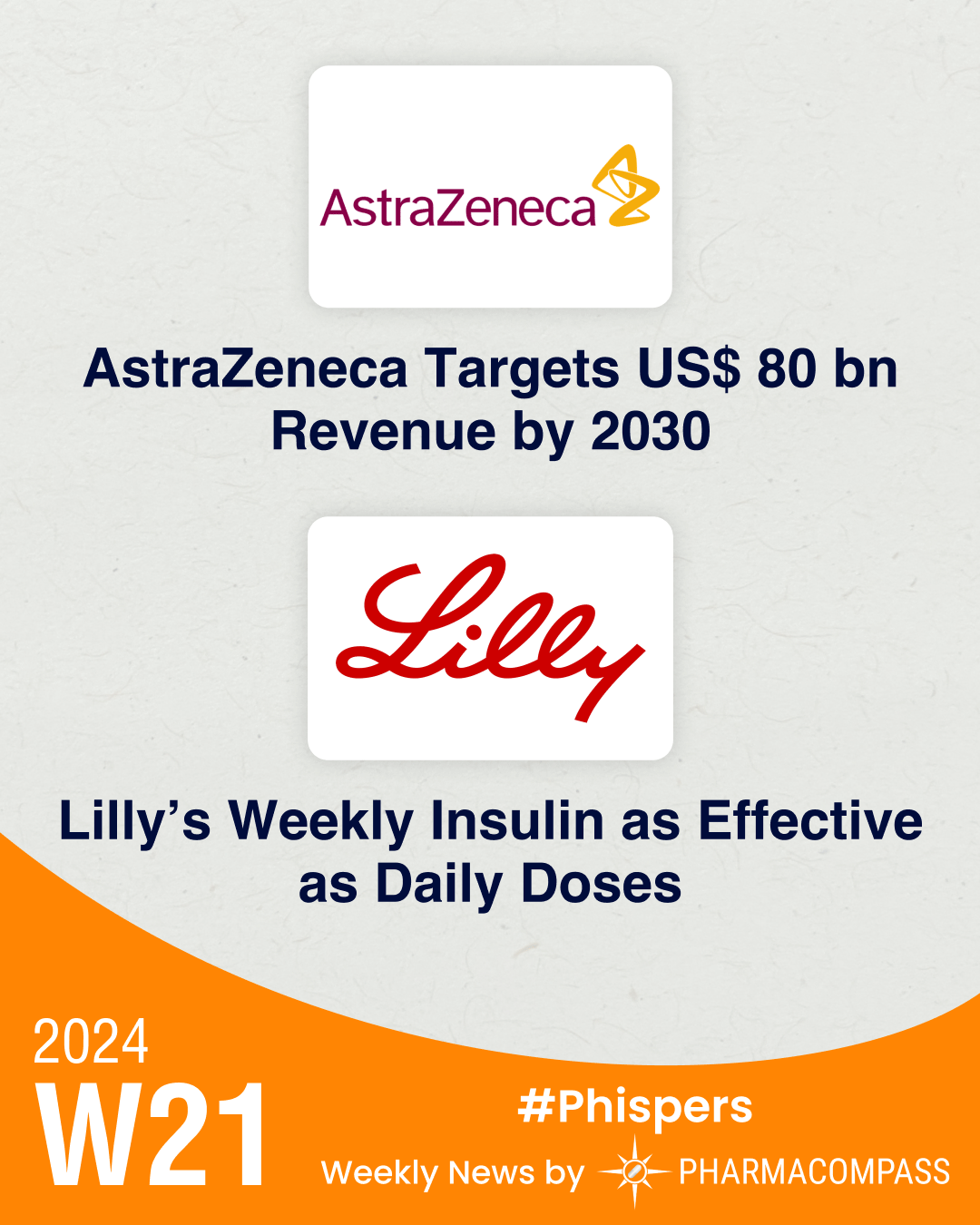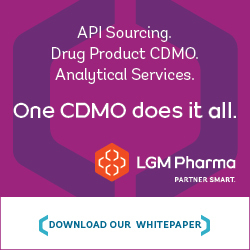
By PharmaCompass
2024-05-23
Impressions: 938 Article || 34 Video
In this week’s news, AstraZeneca has laid out an ambitious plan to achieve US$ 80 billion in revenue by 2030. The drugmaker also announced an investment of US$ 1.5 billion to set up an antibody drug conjugates (ADCs) plant in Singapore.
In news from clinical trials, Eli Lilly’s once-a-week insulin shot — efsitora — scored two late-stage wins. GSK’s long-acting experimental asthma drug depemokimab reduced asthma attacks in two late-stage trials. And Bayer’s non-hormonal menopause drug significantly reduced hot flashes in two phase 3 studies.
In approvals, the US Food and Drug Administration (FDA) has granted accelerated approval to Amgen’s targeted immunotherapy Imdelltra for adults in the advanced stages of small cell lung cancer that has proved hard to treat or has worsened despite chemotherapy. FDA also okayed the first two biosimilars for Regeneron’s blockbuster eye drug Eylea.
A group of cancer victims have sued Johnson & Johnson accusing it of fraud in its plans to settle the talc lawsuits.
In deals, Biogen is acquiring Human Immunology Biosciences (HI-Bio) for up to US$ 1.8 billion, Johnson & Johnson is buying California-based Proteologix for US$ 850 million and Eli Lilly has inked a potential US$ 1.1 billion collaboration with Aktis Oncology.
Astra sets 2030 revenue target at US$ 80 bn, invests US$ 1.5 bn to build ADC facility
AstraZeneca has laid out an ambitious plan to deliver US$ 80 billion in total revenue by 2030. That will be a 75 percent leap from the US$ 45.8 billion in revenue it posted in 2023. Astra expects to launch 20 new medicines by 2030. Astra’s targets are driven by its cancer portfolio, as also its biopharmaceuticals and rare disease portfolios. The drugmaker’s oncology portfolio had brought in US$ 17.1 billion last year.
The update comes on the heels of Astra’s investment of US$ 1.5 billion in building a manufacturing facility in Singapore for ADCs to enhance the global supply of its ADC portfolio.
Meanwhile, Pfizer has launched a new multi-year program to cut costs by around US$ 1.5 billion by 2027-end. Last year, it had announced a US$ 4 billion cost cutting plan.
Lilly’s weekly insulin proves to be as effective as daily doses in two late-stage trials
Eli Lilly’s once-weekly insulin jab, efsitora, showed blood sugar reduction consistent with the daily insulins widely used today by patients with type 2 diabetes. Efsitora met its primary endpoints in two phase 3 trials. Lilly is in a race with Novo Nordisk to bring to market weekly injections with long-acting insulins, which would lower the treatment burden for diabetes patients.
There was disappointing news from its rival Novo on its long-acting weekly insulin — Awiqli (insulin icodec). FDA said the use of this med came with an increased risk of low blood sugar in patients with type 1 diabetes, who are more insulin-dependent. An FDA panel will meet on May 24 to review Novo’s application seeking approval for this once-weekly insulin.
GSK sells remaining stake in Haleon; scores trial wins for asthma drug: GSK has raised £ 1.25 billion (US$ 1.52 billion) by dropping the remainder of its stake (4.2 percent) in Haleon. It also touted two late-stage wins for its experimental asthma drug depemokimab. The med reduced asthma attacks over a year at a rate that was clinically significant.
Bayer’s menopause drug reduces hot flashes in trials: Bayer said its non-hormonal drug, elinzanetant, significantly reduced debilitating bursts of body heat (hot flashes) associated with menopause. This tees it up to become only the second non-hormonal drug to do so after Astellas’ Veozah (fezolinetant).
Amgen’s med grabs FDA’s accelerated nod for small cell lung cancer
FDA has granted accelerated approval to Amgen’s Imdelltra (tarlatamab-dlle) for adults in the advanced stages of small cell lung cancer (SCLC) that has proven to be hard to treat or has worsened despite platinum-based chemotherapy. The bi-specific antibody is a targeted immunotherapy that shrank tumors in 40 percent of patients in a mid-stage trial. SCLC is usually more aggressive and deadlier than non-small cell lung cancer.
First biosimilars for Regeneron’s Eylea okayed: FDA has approved the first interchangeable biosimilars to Eylea (aflibercept) to treat macular degeneration and other eye conditions. The US agency greenlit Biocon Biologics’ Yesafili (aflibercept-jbvf) and Samsung Bioepis and Biogen’s Opuviz (aflibercept-yszy) to be used as a substitute for Regeneron’s blockbuster eye drug.
Cancer victims sue J&J over fraudulent bankruptcies
A group of cancer victims have sued Johnson & Johnson accusing it of fraud for the repeated efforts to use a shell company’s bankruptcy to resolve tens of thousands of lawsuits alleging its talc products contained asbestos and caused cancer.
Biogen to buy HI-Bio for up to US$ 1.8 bn; Merck KGaA to buy Mirus Bio
Biogen has agreed to acquire Human Immunology Biosciences (HI-Bio) for up to US$ 1.8 billion, including an upfront payment of US$ 1.15 billion. The deal gives Biogen a promising candidate — felzartamab — that may be a cure for a range of immune-mediated diseases.
Meanwhile, Merck KGaA has agreed to buy Wisconsin-based Mirus Bio for US$ 600 million. Mirus Bio is a specialist in the development and commercialization of transfection reagents that are used to help introduce genetic material into cells. These reagents play a key role in the production of viral vectors for cell and gene therapies.
J&J to buy Proteologix for US$ 850 mn: Johnson & Johnson is acquiring Proteologix for US$ 850 million in cash to advance its dermatology portfolio with the opportunity to address significant unmet need in atopic dermatitis.
Aktis in radiopharma deal with Lilly: Aktis Oncology is collaborating with Eli Lilly to discover and develop novel anti-cancer radiopharmaceuticals. Aktis will receive an upfront payment of US$ 60 million, and will be eligible for milestone payments of US$ 1.1 billion.
The PharmaCompass Newsletter – Sign Up, Stay Ahead
Feedback, help us to improve. Click here
Image Credit : Phisper Infographic by PharmaCompass license under CC BY 2.0
“ The article is based on the information available in public and which the author believes to be true. The author is not disseminating any information, which the author believes or knows, is confidential or in conflict with the privacy of any person. The views expressed or information supplied through this article is mere opinion and observation of the author. The author does not intend to defame, insult or, cause loss or damage to anyone, in any manner, through this article.”







